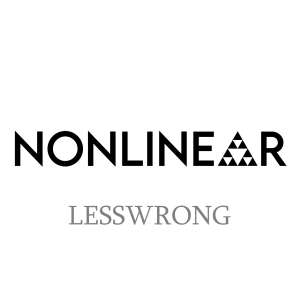

Link to original articleWelcome to The Nonlinear Library, where we use Text-to-Speech software to convert the best writing from the Rationalist and EA communities into audio. This is: Masterpiece, published by Richard Ngo on February 14, 2024 on LessWrong.
A sequel to qntm's
Lena. Reading Lena first is helpful but not necessary.
We're excited to announce the fourth annual MMindscaping competition! Over the last few years, interest in the art of mindscaping has continued to grow...
Link to original article
Welcome to The Nonlinear Library, where we use Text-to-Speech software to convert the best writing from the Rationalist and EA communities into audio. This is: Masterpiece, published by Richard Ngo on February 14, 2024 on LessWrong.
A sequel to qntm's
Lena. Reading Lena first is helpful but not necessary.
We're excited to announce the fourth annual MMindscaping competition! Over the last few years, interest in the art of mindscaping has continued to grow rapidly. We expect this year's competition to be our biggest yet, and we've expanded the prize pool to match. The theme for the competition is "Weird and Wonderful" - we want your wackiest ideas and most off-the-wall creations!
Competition rules
As in previous competitions, the starting point is a base MMAcevedo mind upload. All entries must consist of a single modified version of MMAcevedo, along with a written or recorded description of the sequence of transformations or edits which produced it. For more guidance on which mind-editing techniques can be used, see the Technique section below.
Your entry must have been created in the last 12 months, and cannot have been previously submitted to any competition or showcase. Submissions will be given preliminary ratings by a team of volunteers, with finalists judged by our expert panel:
Roger Keating, mindscaping pioneer and founder of the MMindscaping competition.
Raj Sutramana, who has risen to prominence as one of the most exciting and avant-garde mindscaping artists, most notably with his piece Screaming Man.
Kelly Wilde, director of the American Digital Liberties Union.
All entries must be received no later than 11.59PM UTC, March 6, 2057.
Award criteria
Our judges have been instructed to look for technique, novelty, and artistry. More detail on what we mean by each of these:
Technique. Mindscaping is still a young art, and there are plenty of open technical challenges. These range from the classic problem of stable emotional engineering, to recent frontiers of targeted memory editing, to more speculative work on consciousness funnels. Be ambitious! Previous winners of our technique prize have often pushed the boundaries of what was believed possible.
Even when an effect could be achieved using an existing technique, though, submissions that achieve the same outcome in more efficient or elegant ways will score highly on the technique metric. Conversely, we'll penalize brute-force approaches - as a rough guide, running a few thousand reinforcement learning episodes is acceptable, but running millions isn't.
We also discourage approaches that involve overwriting aspects of MMAcevedo's psyche with data from other uploads: part of the competition is figuring out how to work with the existing canvas you've been given.
Novelty. Given that there have now been millions of MMAcevedo variants made, it's difficult to find an approach that's entirely novel. However, the best entries will steer clear of standard themes. For example, we no longer consider demonstrations of extreme pleasure or pain to be novel (even when generated in surprising ways). We're much more interested in minds which showcase more complex phenomena, such as new gradients of emotion.
Of course, it's up to the artist to determine how these effects are conveyed to viewers. While our judges will have access to standard interpretability dashboards, the best entries will be able to communicate with viewers more directly.
Artistry. Even the most technically brilliant and novel work falls flat if not animated by artistic spirit. We encourage artists to think about what aspects of their work will connect most deeply with their audience. In particular, we're excited about works which capture fundamental aspects of the human experience that persist even across the biological-digital divide - for example, by exploring themes from Miguel Acevedo's pre-upload life.
These three criteria are aptly demonstrated by many of our previous prizewinners, such as:
Discord, a copy with ...
View more
Welcome to The Nonlinear Library, where we use Text-to-Speech software to convert the best writing from the Rationalist and EA communities into audio. This is: Masterpiece, published by Richard Ngo on February 14, 2024 on LessWrong.
A sequel to qntm's
Lena. Reading Lena first is helpful but not necessary.
We're excited to announce the fourth annual MMindscaping competition! Over the last few years, interest in the art of mindscaping has continued to grow rapidly. We expect this year's competition to be our biggest yet, and we've expanded the prize pool to match. The theme for the competition is "Weird and Wonderful" - we want your wackiest ideas and most off-the-wall creations!
Competition rules
As in previous competitions, the starting point is a base MMAcevedo mind upload. All entries must consist of a single modified version of MMAcevedo, along with a written or recorded description of the sequence of transformations or edits which produced it. For more guidance on which mind-editing techniques can be used, see the Technique section below.
Your entry must have been created in the last 12 months, and cannot have been previously submitted to any competition or showcase. Submissions will be given preliminary ratings by a team of volunteers, with finalists judged by our expert panel:
Roger Keating, mindscaping pioneer and founder of the MMindscaping competition.
Raj Sutramana, who has risen to prominence as one of the most exciting and avant-garde mindscaping artists, most notably with his piece Screaming Man.
Kelly Wilde, director of the American Digital Liberties Union.
All entries must be received no later than 11.59PM UTC, March 6, 2057.
Award criteria
Our judges have been instructed to look for technique, novelty, and artistry. More detail on what we mean by each of these:
Technique. Mindscaping is still a young art, and there are plenty of open technical challenges. These range from the classic problem of stable emotional engineering, to recent frontiers of targeted memory editing, to more speculative work on consciousness funnels. Be ambitious! Previous winners of our technique prize have often pushed the boundaries of what was believed possible.
Even when an effect could be achieved using an existing technique, though, submissions that achieve the same outcome in more efficient or elegant ways will score highly on the technique metric. Conversely, we'll penalize brute-force approaches - as a rough guide, running a few thousand reinforcement learning episodes is acceptable, but running millions isn't.
We also discourage approaches that involve overwriting aspects of MMAcevedo's psyche with data from other uploads: part of the competition is figuring out how to work with the existing canvas you've been given.
Novelty. Given that there have now been millions of MMAcevedo variants made, it's difficult to find an approach that's entirely novel. However, the best entries will steer clear of standard themes. For example, we no longer consider demonstrations of extreme pleasure or pain to be novel (even when generated in surprising ways). We're much more interested in minds which showcase more complex phenomena, such as new gradients of emotion.
Of course, it's up to the artist to determine how these effects are conveyed to viewers. While our judges will have access to standard interpretability dashboards, the best entries will be able to communicate with viewers more directly.
Artistry. Even the most technically brilliant and novel work falls flat if not animated by artistic spirit. We encourage artists to think about what aspects of their work will connect most deeply with their audience. In particular, we're excited about works which capture fundamental aspects of the human experience that persist even across the biological-digital divide - for example, by exploring themes from Miguel Acevedo's pre-upload life.
These three criteria are aptly demonstrated by many of our previous prizewinners, such as:
Discord, a copy with ...
Comments (3)
More Episodes
All Episodes>>You may also like
Creat Yourt Podcast In Minutes
- Full-featured podcast site
- Unlimited storage and bandwidth
- Comprehensive podcast stats
- Distribute to Apple Podcasts, Spotify, and more
- Make money with your podcast
It is Free












